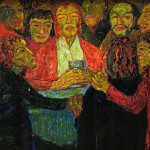 How important is being a Christian to being an American? How important is it that America be a Christian nation for being the Church in America? A Pew study titled “What It Takes to Truly Be ‘One of Us’” reveals that Americans are sharply divided along partisan lines on the importance of the Christian religion:
How important is being a Christian to being an American? How important is it that America be a Christian nation for being the Church in America? A Pew study titled “What It Takes to Truly Be ‘One of Us’” reveals that Americans are sharply divided along partisan lines on the importance of the Christian religion:
A clear partisan split in the U.S. also exists on the importance of being Christian. More than four-in-ten Republicans (43%) say it is a very important part of being an American. Fewer Democrats (29%) and independents (26%) share this view.
Where do you stand on this spectrum, regardless of your political affiliation?
I wonder if the early church struggled in this same manner—and regardless of believers’ political stripes. How important was being Jewish to being a follower of Jesus? (It wasn’t until Antioch that Jesus’ followers were first called Christians; Acts 11:26). Since Abraham, circumcision was critically important to being Jewish. For many of the first Jewish Christians, it made sense that circumcision was critically important to being full participants in the church—no matter where in the world. The Jerusalem Council was convened to determine if circumcision was required of Gentile converts to the Christian faith (See Acts 15). It was determined at the Jerusalem Council that it only takes faith in Jesus for Gentile adherents to be truly ‘one of us.’
Paul often faced this struggle in various church settings, whether in addressing the church in Galatia and Philippi or in taking part in the Jerusalem Council debate. He contended that faith alone was necessary for Gentile Christians to be truly ‘one of us.’ Beyond the Christian context, Paul also faced a similar struggle with his fellow Jews. He was beaten severely in Jerusalem for being wrongly accused of betraying his Jewish people, the Law and the Temple wherever he went. They sought to kill him for his seeming disloyalty (See Acts 21:27-36).
The Apostle Paul struggled to convince people that he could still be a good Jewish person even if he did not make Gentile followers of Jesus be circumcised. He also struggled to convince some people that it was not essential to the Church being healthy and vibrant that all its members be circumcised. I wonder what it was like for many Jewish and Christian people living in the Roman Empire where they were the religious minority. How would we in America fare if the same were true today? (According to a Pew study in 2015, Christianity is still the majority religion, and Evangelical Christianity is still the largest branch).
America is a uniquely religious nation. G. K. Chesterton famously quipped that the U.S. is “a nation with the soul of a church.” The basis for Chesterton’s claim was that America was founded on a creed. Still, one of the principal architects of that American creed, Thomas Jefferson, sought to privatize religion. Even so, some American Evangelicals today view other religions as a threat to national identity. From the vantage point of certain moral intuitions that Evangelical Christians often cherish (such as purity, authority and loyalty), it is not difficult to understand their concern regardless of what one makes of it (Refer here). What makes it more complicated for some is that so much of this nation’s history and civil religious experience involves key aspects of the Christian narrative. Thus, they may find it quite easy to answer the opening question of this blog post: it is very important to be a Christian to being a true American. But what about the second question posed at the outset of the post — “How important is it that America be a Christian nation for being the Church in America?” If Paul were here, how do you think he would have answered this question given how he engaged his Jewish heritage and Gentile believers wherever he went?













